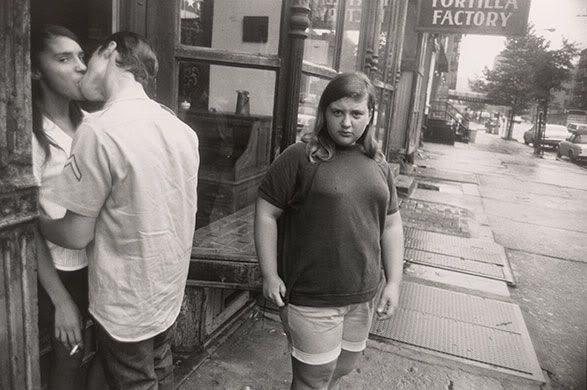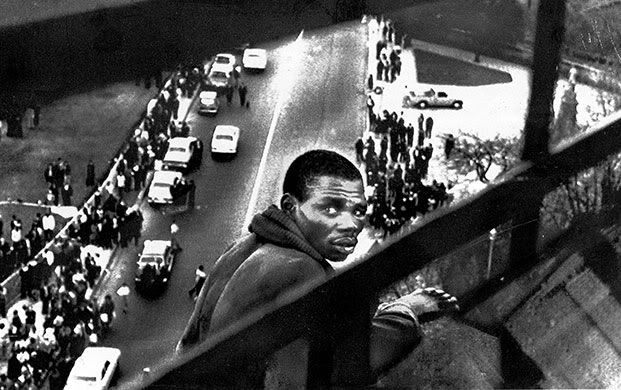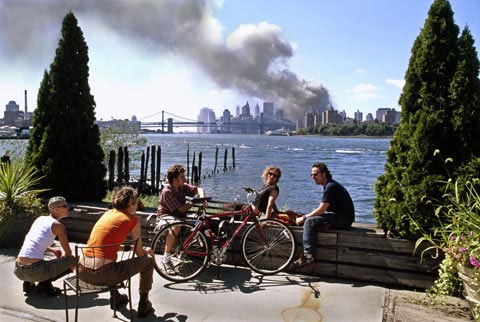Showing posts with label Photography. Show all posts
Showing posts with label Photography. Show all posts
Sunday, July 21, 2013
Monday, March 11, 2013
Thursday, December 20, 2012
Monday, November 19, 2012
Wednesday, October 24, 2012
Sunday, September 2, 2012
Monday, January 2, 2012
Saturday, October 8, 2011
Monday, September 26, 2011
Saturday, September 24, 2011
Saturday, September 3, 2011
Young people on the Brooklyn waterfront on Sept. 11
I was reading the morning digital papers and came across an article with this photograph...
I only saw it for the first time this morning. It's a fascinating photograph. Photographer Thomas Hoepker took it, and wrote about it at Slate. My two cents, I think it's a fool's errand to try and find any kind of definitive meaning or message from the photograph. As Hoepker says, "...the picture seemed strange and surreal. It asked questions but provided no answers."
I only saw it for the first time this morning. It's a fascinating photograph. Photographer Thomas Hoepker took it, and wrote about it at Slate. My two cents, I think it's a fool's errand to try and find any kind of definitive meaning or message from the photograph. As Hoepker says, "...the picture seemed strange and surreal. It asked questions but provided no answers."
Monday, November 1, 2010
Saturday, September 4, 2010
The Jazz Loft Project
| Once upon a time there was a really incredible documentary magazine called DoubleTake. Issue 18 had Zoot Sims on the cover and an accompanying story entitled, “Nights of Incandescence” about the loft W. Eugene Smith had in New York in the 50’s and 60’s. Sadly, DoubleTake is no more, but that cover story grew into The Jazz Loft Project. Currently on exhibition at the gorgeous but labyrinth-like Chicago Cultural Center until September 19th. |
“From 1957 to 1965, [photographer W. Eugene] Smith exposed 1,447 rolls of film at the loft, making roughly 40,000 pictures, the largest body of work in his career. He photographed the nocturnal jazz scene as well as life on the streets of the flower district, as seen from his fourth-floor window. He wired the building like a surreptitious recording studio and made 1,740 reels (4,000 hours) of stereo and mono audiotapes, capturing more than 300 musicians, among them Roy Haynes, Sonny Rollins, Bill Evans, Roland Kirk, Alice Coltrane, Don Cherry, and Paul Bley. He also recorded legends such as pianists Eddie Costa, and Sonny Clark, drummers Ronnie Free and Edgar Bateman, saxophonist Lin Halliday, bassist Henry Grimes, and multi-instrumentalist Eddie Listengart. Also dropping in on the nighttime scene were the likes of Doris Duke, Norman Mailer, Diane Arbus, Robert Frank, Henri Cartier-Bresson, and Salvador Dalí, as well as pimps, prostitutes, drug addicts, thieves, photography students, local cops, building inspectors, marijuana dealers, and others.”
I went yesterday and it was amazing. If you live in Chicago and have an interest in photography and/or jazz, it is not to be missed!
 |  |
Labels:
Jazz,
Photography,
The Jazz Loft Project,
W. Eugene Smith,
Zoot Sims
Wednesday, June 23, 2010
Photography
It’s funny the coincidental concatenation of things. I bought a new camera recently and have since come across all manner of interesting photography tidbits.
Take for example an exhibition about to open at the Tate Modern called, Exposed: Voyeurism, Surveillance and the Camera. The exhibit focuses on what’s probably my favorite type of photography, “pictures made on the sly, without the explicit permission of the people depicted.” Some highlights:

New York (Couple Kissing, Girl Staring at Camera, Tortilla Factory), by Garry Winogrand, 1969

A young man called Amos Gexella looks back towards safety while perched on the sixth-floor balcony of a building in downtown Johannesburg, 4 August 1975. An estimated 2,000 onlookers yelled: "Jump! Jump!" Two hours later, Amos rolled off the parapet and fell to his death.

The master, Walker Evans, Street Scene, New York, 1928. But you can't talk about Evans and not mention what I consider his masterwork, Many Are Called .
.


Mandatory for anyone even remotely interested in photography.
Then I came across an article from The Guardian about Bruce Davidson and was blown away by the accompanying photograph.

'Beautiful Cathy was always there, always sad' ... the Brooklyn Gang. Photograph: Bruce Davidson/Steidl
But it just kept coming. In the mail I got the new Art Institute Member Magazine with an amazing Henri Cartier-Bresson photograph on the cover announcing an upcoming exhibition.

I could leave it at that, but I feel as if I was cheating if I didn't mention two of my favorite photography books that cover the same styles and themes, Weegee's World and Stanley Kubrick: Drama & Shadows
and Stanley Kubrick: Drama & Shadows :
:
Take for example an exhibition about to open at the Tate Modern called, Exposed: Voyeurism, Surveillance and the Camera. The exhibit focuses on what’s probably my favorite type of photography, “pictures made on the sly, without the explicit permission of the people depicted.” Some highlights:

New York (Couple Kissing, Girl Staring at Camera, Tortilla Factory), by Garry Winogrand, 1969

A young man called Amos Gexella looks back towards safety while perched on the sixth-floor balcony of a building in downtown Johannesburg, 4 August 1975. An estimated 2,000 onlookers yelled: "Jump! Jump!" Two hours later, Amos rolled off the parapet and fell to his death.

The master, Walker Evans, Street Scene, New York, 1928. But you can't talk about Evans and not mention what I consider his masterwork, Many Are Called

Mandatory for anyone even remotely interested in photography.
Then I came across an article from The Guardian about Bruce Davidson and was blown away by the accompanying photograph.

'Beautiful Cathy was always there, always sad' ... the Brooklyn Gang. Photograph: Bruce Davidson/Steidl
But it just kept coming. In the mail I got the new Art Institute Member Magazine with an amazing Henri Cartier-Bresson photograph on the cover announcing an upcoming exhibition.

I could leave it at that, but I feel as if I was cheating if I didn't mention two of my favorite photography books that cover the same styles and themes, Weegee's World
 |  |
Monday, April 26, 2010
New Camera
About two weeks ago my Canon PowerShot S410 died. She had a good run. It was time for an upgrade. After consulting armature and professional alike, and not having $5,000 plus for a Leica M9, I bought the Panasonic Lumix DMC-LX3.

Panasonic and Leica share technologies, so this basically the Leica DLUX-4, with slightly altered styling and a savings of about $200.
The day after I bought the camera, having barely figured out how to point and shoot, I decided to break it in with a trip to the Golden Gloves Boxing finals. Ignoring the "NO PHOTOS" signs and "No flash photography is allowed" announcements I took a seat in the stands and started taking some covert crowd shots. Toward the end of the evening I noticed the fighters warming up and sparing at the edge of the gym. This being a school gym converted for the night into a boxing arena there were no dressing rooms. I made my way down to where the fighters were and started taking photos. I was looking to capture something of the 50's, something Noir in feel. I took picture after picture, after awhile, getting a little cocky, I just pulled the camera out and started shooting outright. Unbeknown to me the security desk was directly behind the sparing fighters. I must have taken 25 or 30 shots when into the frame came an enormous hand and a voice was heard telling me my camera was being confiscated.
Busted.
The first security guy didn't know how to delete the photos from my camera. But the second one did. My stomach fell as he started deleting picture after picture. Thankfully, when he was done, he handed the camera to me and told me to leave. I did.
Thankfully, this isn't the end of the story. I know a few geeks. Their kung-fu is the best. One I know was able to take the flash drive and with some fancy freeware recover all the erased shots I'd taken! In the slide show below there are two versions of my favorite shot from the night.

Panasonic and Leica share technologies, so this basically the Leica DLUX-4, with slightly altered styling and a savings of about $200.
The day after I bought the camera, having barely figured out how to point and shoot, I decided to break it in with a trip to the Golden Gloves Boxing finals. Ignoring the "NO PHOTOS" signs and "No flash photography is allowed" announcements I took a seat in the stands and started taking some covert crowd shots. Toward the end of the evening I noticed the fighters warming up and sparing at the edge of the gym. This being a school gym converted for the night into a boxing arena there were no dressing rooms. I made my way down to where the fighters were and started taking photos. I was looking to capture something of the 50's, something Noir in feel. I took picture after picture, after awhile, getting a little cocky, I just pulled the camera out and started shooting outright. Unbeknown to me the security desk was directly behind the sparing fighters. I must have taken 25 or 30 shots when into the frame came an enormous hand and a voice was heard telling me my camera was being confiscated.
Busted.
The first security guy didn't know how to delete the photos from my camera. But the second one did. My stomach fell as he started deleting picture after picture. Thankfully, when he was done, he handed the camera to me and told me to leave. I did.
Thankfully, this isn't the end of the story. I know a few geeks. Their kung-fu is the best. One I know was able to take the flash drive and with some fancy freeware recover all the erased shots I'd taken! In the slide show below there are two versions of my favorite shot from the night.
Subscribe to:
Posts (Atom)


















